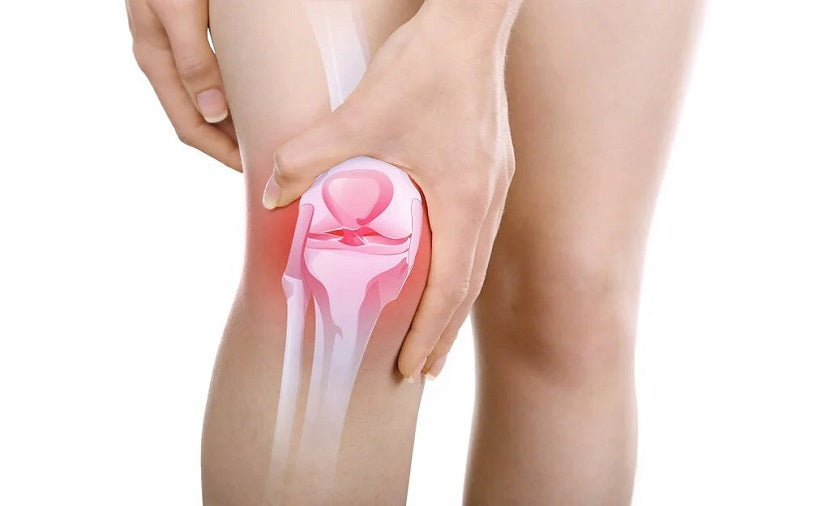If you have aching bones and joints, this is the perfect time to understand how collagen can benefit you. Collagen peptides in clinical research are proving beneficial for reducing overall inflammation within the skin, bones, cartilage and cardiovascular system. Joint pain and poor bone health can be debilitating.
If there is a possibility to improve your quality of life with simple collagen peptides, I say go for it. Upon aging our bones, ligaments and joints become compromised (especially after menopause); we must consider this to support ongoing health and wellbeing.
Did you know that there are 100 different forms of arthritis?
These inflammatory conditions influence the joints, tissues around the joint, and other connective tissues. Joint pain is one of the most common types of chronic pain we're facing today. Due to this, research is exploding on finding solutions and it just so happens—collagen is one of them.
Collagen demonstrates promising benefits for joint, bone, skin, hair, nails and cardiovascular health. One meta-analysis supplementing oral collagen intake over 90 days showed significant reductions in arthritic pain and concluded that ‘Oral collagen has a role to play in the treatment of osteoarthritis.'
How Collagen Helps Bone & Joint Health
- Improving tendons, ligaments and bone health
- Significantly improving the quality of hair, skin and nails
- Promoting corneal and eye health
- Repairing cartilage damage and arthritic conditions
- Remodelling cardiovascular structural integrity (e.g. veins, arteries and blood vessels)
- Helping to rebuild cartilage within the knees, hip, lower back, neck and finger joints
- Supporting bone remodelling and structure
Read more about what collagen peptides are here.

Will Collagen Help With Arthritis & Aging Bones?
Aging is a natural physiological process that changes the anatomy and physiology of all organs, tissues and cells. Osteoarthritis and rheumatoid arthritis are increasing at alarming rates, so it’s critical to focus on preventative and joint supportive interventions. The earlier we can prevent and be aware of such influences, the better our long-term quality of life. Collagen type II peptides are gaining popularity in the scientific world for enhancing joint flexibility and mobility.
One 2017 study demonstrated that ‘oral collagen has a more debatable response rate in patients with rheumatoid arthritis (RA), especially when compared with methotrexate, an existing therapy’.
Type II hydrolysed collagen supplementation significantly reduces articular pain by promoting internally made hyaluronic acid (antioxidant) within the synovial membranes (this is the connective tissue that lines the inner joint and tendons) —so it’s kind of a big deal! Hydrolysed collagen essentially supports the structural integrity of bones, joints, muscle and cartilage.
Does Collagen Help With Cartilage Repair?
Collagen is a major component of cartilage and connective tissue. This is why supplementing collagen provides such value to the collagen matrix as stimulates chondrocytes. Chondrocytes are the cells that produce cartilage, a gel-like substance that reduces friction between bones and joints. Collagen peptide utilisation occurs quickly (so long as it’s hydrolysed), with studies showing accumulation in cartilage tissue in just a few hours.

Can Collagen Reduce Joint Pain?
Collagen peptides are superior for reducing joint and muscle pain, as well as, increasing joint mobility. Studies have shown substantial benefits for inflammatory joint conditions like arthritis and osteoarthritis. Collagen directly supports cartilage, reduces inflammation and can provide an enhanced quality of life. One supplementation of hydrolysed collagen can reach the skin, bones, cartilage and connective tissues and stay there for up to 14 days. Oral collagen can substantially reduce inflammatory cytokines and inflammatory cascades that influence bone and joint pain.
Research indicates that inflammatory markers trigger synovial membranes to release collagen III peptides, concluding that collagen is essential for ensuring healthy bone joint fluidity, elasticity and circulation.
How Do Collagen Peptides Help Bone Health?
Collagen is a structural protein found in bones and is an essential supplement for women in menopause given the lowered oestrogen production. Oestrogen is required for healthy bones—this makes menopausal women further predisposed to osteopenia or osteoporosis. Approximately 34% of women are diagnosed with osteoporosis post-menopause.
‘Approximately 34% of women are diagnosed with osteoporosis post-menopause.’
Collagen peptides show osteoprotective (bone protective) effects on bone health, particularly, the retention of calcium and upregulation of bone remodelling processes. A one-year study concluded taking 5g of collagen peptides resulted in a statistically significant increase in bone matrix density in the spine and femoral neck, whereas the placebo showed a continued decrease in their bone matrix density.
Collagen amino acid structures provide essential benefits to bone development as they trigger new bone cells to be made from bone marrow.
If you’re suffering from bone or joint pain, collagen peptides are an excellent intervention to nourish these structures and reduce inflammation. Collagen peptides in conjunction with Happy Turmeric would be an ideal anti-inflammatory combination. You can read more about how stress influences your collagen.
Please feel free to reach out to our HHY Holistic Health Team if you have any questions!
REFERENCES
Bay-Jensen et al. (2018). Aggrecanase degradation of type III collagen is associated with clinical knee pain. Clinical Biochemistry, Aug;58:37-43.
Czajka et al (2018). Daily oral supplementation with collagen peptides combined with vitamins and other bioactive compounds improves skin elasticity and has a beneficial effect on joint and general wellbeing. Nutrition Research, Sep;57:97-108.
García-Coronado et al. (2018). Effect of collagen supplementation on osteoarthritis symptoms: a meta-analysis of randomized placebo-controlled trials. Internataional Orthopaedics, Mar;43(3):531-538.
Honvo et al. (2020). Role of Collagen Derivatives in Osteoarthritis and Cartilage Repair: A Systematic Scoping Review With Evidence Mapping. Rheumatology and Therapy, Dec;7(4):703-740.
Sbricoli et al. (2020). Selection of Collagen Membranes for Bone Regeneration: A Literature Review. Materials, 13(3):786.
Woo T, Lau L, Cheung N, Chan P. (2017). Efficacy of Oral Collagen in Joint Pain - Osteoarthritis and Rheumatoid Arthritis. Journal of Arthritis, Jan:06(02).
Zdzieblik D, Oesser S, König D. (2021). Specific Bioactive Collagen Peptides in Osteopenia and Osteoporosis: Long-Term Observation in Postmenopausal Women. Journal of Bone Metabolism, Aug;28(3):207–213.









Leave a comment
This site is protected by hCaptcha and the hCaptcha Privacy Policy and Terms of Service apply.